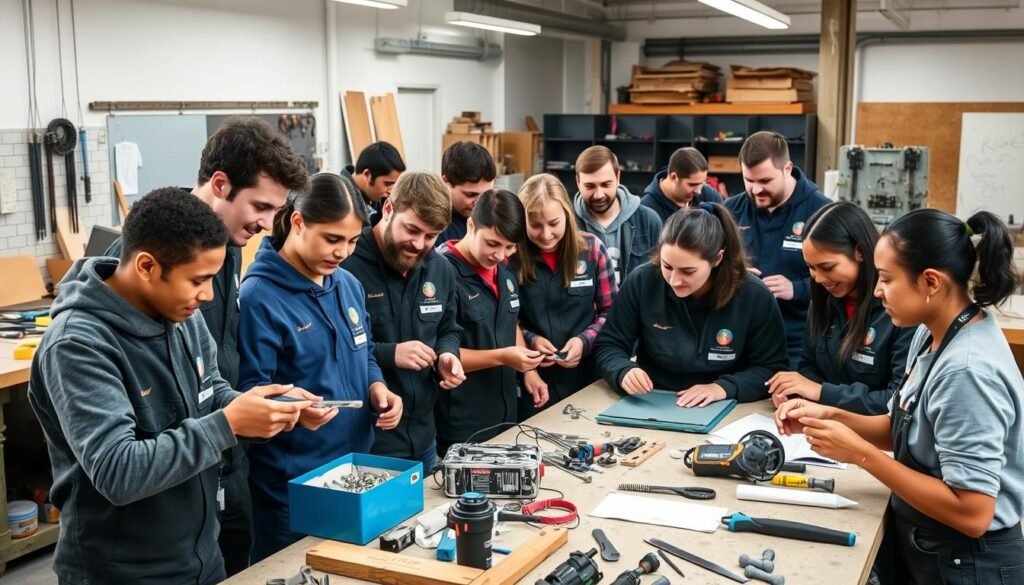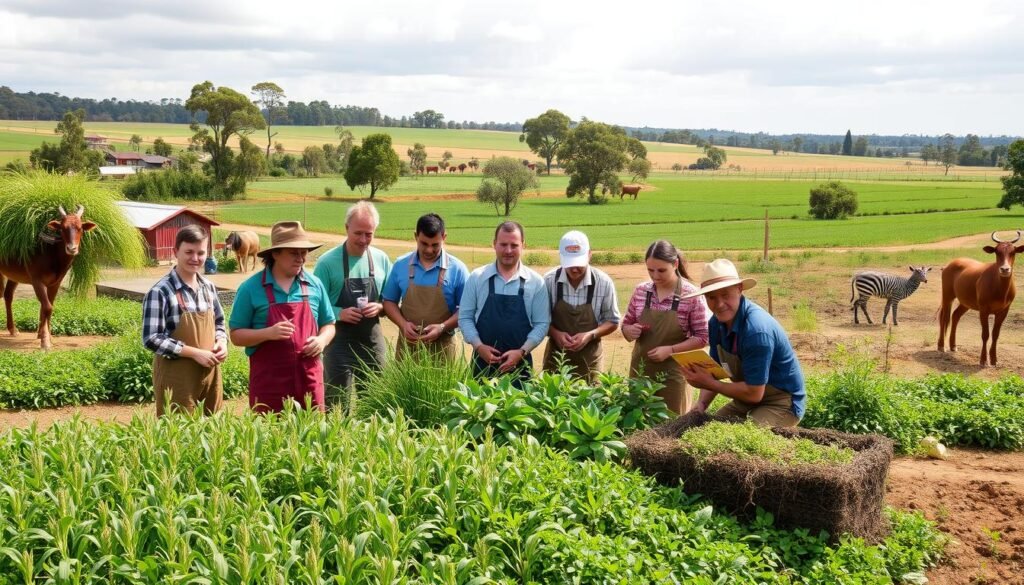Did you know full-time apprentices can get up to $5,000 over two years? This fact highlights the Australian Government’s commitment to vocational learning. It supports the upcoming generation in the trades. Now, more aid is available to help with the practical training of apprentices and trainees nationwide.
In Australia, vocational education is key to creating a skilled workforce. Those in studies or Australian Apprenticeships can get financial help. Whether starting out or in the middle of training, financial support is here for you.
Services Australia offers various payments to those aged 16 to 24. This includes the Youth Allowance for different needs. It helps those who must live away for study, are in a full-time apprenticeship, or can’t study full-time due to health or schedule issues. Starting is easy – you can apply for Youth Allowance online via myGov, providing quick assistance.
Major Highlights
- Eligibility for financial support includes undertaking an Australian Apprenticeship or full-time studies.
- Services Australia’s Youth Allowance caters to diverse apprentice and trainee needs, aiding those even if unable to study full-time.
- Claims for student payments can be conveniently initiated online, making the process readily accessible.
- Language support and specific closure dates for Centrelink services highlight the tailored approach to assisting individual circumstances.
- Page information is updated regularly to provide the most current guidance, with the last update being on 2 December 2024.
Youth Allowance for Students and Australian Apprentices
Getting a good grasp on the Youth Allowance system is key for students and apprentices. It provides financial support for those studying full-time or in Australian Apprenticeships. This support is crucial for those between 16 and 24, aiming to ease their financial burdens during education or training.
Eligibility Criteria for Youth Allowance
To be eligible for Youth Allowance, there are some boxes you need to tick. These include being the right age, living in Australia, and studying or apprenticing full time. The main points for Youth Allowance eligibility are:
- Being between 16 and 24 years old.
- Having Australian residency.
- Studying full-time at an approved institute or doing a full-time Australian Apprenticeship.
There’s also the matter of passing income and assets tests to receive payments. If your income is over a certain limit, it might mean getting a smaller fortnightly payment.
Steps to Claim Your Youth Allowance Payment
Ready to claim Youth Allowance? Here’s what you need to do:
- Start by creating or logging into a myGov account and link it to Centrelink.
- Fill out the online claim with your details and proof of eligibility, like ID, residency, and study or apprenticeship enrollment.
- Finally, submit your claim. If you need help or can’t claim online, there’s phone support available.
Don’t forget to watch out for Centrelink’s closure dates around public holidays in 2024. This will help you avoid any delays in your application.
Alternative Support for Apprentices Unable to Study Full Time
Some apprentices can’t study full-time due to issues like illness or disability. Fortunately, they can access adjusted support and criteria that fit their unique situations.
Those needing flexible arrangements because of their apprenticeship courses also get customized support. This way, all apprentices can get the financial help they need to succeed.
Exploring Wage and Salary Entitlements Under Fairwork Australia
For apprentices in Australia, knowing about wage entitlements and apprentice salary schemes is key. Fairwork Australia guidelines make sure that apprentices get paid fairly for their work.
An apprentice’s wage depends on their specific industry award or arrangement. Factors like age, years out of school, and skills being learned are considered. Knowing these guidelines helps apprentices understand what they should earn.

- Employers must pay apprentices at least the minimum wage for their award.
- Apprentices can join unions and take part in legal strikes under the Commonwealth Fair Work Act 2009.
- Besides hourly pay, wage entitlements include sick, annual, and parental leave as per the industrial award.
After the Annual Wage Review 2022-23, there was a 5.75% increase in modern award minimum wages. Sectors like Accommodation and Food Services, Health Care, and Retail Trade were affected. This shows Fairwork Australia’s dedication to fair wages across industries.
It’s crucial for apprentices to keep up with changes in wage entitlements and apprentice salary schemes. This ensures they are paid properly according to the Fairwork Australia guidelines. Apprentices and employers should always check these guidelines to ensure fairness in apprenticeship deals.
Government Incentives for Apprenticeships and Vocational Education
The Australian Government is working hard to make vocational training and apprenticeships better. It has introduced special offers to help build a skilled workforce. These include government subsidies for students and Australian Apprenticeship Support Loans, aiming to reduce financial stress. This encourages people to choose various career paths.
The Australian Apprenticeship Support Loans are key to these incentives. They help apprentices by offering necessary funds up to $25,374. With easy repayment terms and discounts for completing their courses, apprentices find technical education within reach.
The Scope of Australian Apprenticeship Support Loans
In Queensland, government subsidies show a big impact, benefitting over 82,000 locals through Free TAFE. They access around 200 courses. Plans are in place to keep offering similar support, ensuring ongoing help for future professionals.
Australian Apprentice Training Support Payment Explained
The Australian Apprentice Training Support Payment provides vital assistance. It helps with regular study costs and daily living expenses. This allows apprentices to concentrate on their training without financial worry.
New Energy Apprentice Support Payment and Clean Energy Careers
The New Energy Apprentice Support Payment aims at clean energy careers. It backs those choosing jobs in growing green sectors. This move supports environmentally friendly practices financially.
- Free Diploma of Nursing: Reflecting government’s commitment to healthcare, up to 3,500 Queenslanders get fee-free access to this crucial field.
- Construction Workforce Fund: Tied to the Homes for Queensland Plan, it helps about 2,250 adults over 25 enter construction apprenticeships.
- Trade Skills Assessment and Gap Training: This helps people with industry experience get trade qualifications faster.
Moreover, schemes like the Certificate 3 Guarantee and User Choice help with starting training and getting first qualifications. These programs show the government’s dedication to creating a skilled workforce ready for today’s challenges. Queensland’s focused efforts in vocational incentives clearly show how smart education investments lead to long-term economic growth.
Student and Apprentice Payment: Navigating Through Funding Options
To really get how student payment plans and apprentice remuneration options work, we need to look at the different supports available. This helps both learners and employers make the most of training schemes. Knowing about the funding for students and apprentices is key for them.
When we dive into these supports, we see they vary to match what apprentices and industries need. Let’s go over a few major financial aids:
| Support Program | Benefit | Eligibility |
|---|---|---|
| User Choice Funding | Covers 50-100% of training costs | Eligible Queensland apprentices, training within approved qualifications |
| Living Away From Home Allowance | Assists with residential costs | Apprentices moving for the first time or homeless |
| Trade Support Loans | Financial support up to a certain amount | Australian Apprentices undertaking Certificate II or higher |
| Training Support Payment | Biannual payment to mitigate living costs | Eligible apprentices and trainees for up to two years |
The ‘Back to Work’ program in Queensland helps too. It gives businesses up to $20,000, making it easier to hire apprentices.
- Good funding for students and apprentices means fewer drop out because of money troubles.
- With better apprentice remuneration options, apprentices enjoy their work more. This builds a stronger future workforce.
- Student payment plans that are well thought out help more people access education, improving skills nationwide.
Making funds easy to get and fitting them to what apprentices and sectors need is key. It connects learning to work, making sure the investment in education pays off with skilled workers.
Maximising Financial Support for Apprentices with the Living Away From Home Allowance
The Living Away From Home Allowance (LAFHA) is a key source of support for students and apprentices. It helps those who must relocate to start or continue their apprenticeship. Let’s look into who can get LAFHA and the benefits it brings.
Criteria to Qualify for LAFHA
To get the Living Away From Home Allowance, apprentices need to meet certain rules. They must be officially an apprentice and move to take up their apprenticeship. This move should be from their family home to somewhere far enough to need the move. If an apprentice gets other allowances like Youth Allowance from Centrelink, they might not get LAFHA.
Benefits of the Living Away From Home Allowance
LAFHA provides vital financial help in the tough early years of an apprenticeship. Let’s see how LAFHA helps:
- Tiered Weekly Payments: Apprentices receive weekly money that increases with each year of training. This is essential for covering living costs as they move forward.
- Simplified Access: The government made it easier to get LAFHA based on apprentice feedback. Now, the claim process is easy to understand.
- Comprehensive Support: LAFHA gives not just money, but also moral support. It recognizes the hard work of apprentices and helps them adapt to new places.
This table shows how LAFHA support grows over an apprentice’s training:
| Year of Apprenticeship | Weekly Payment | Cumulative Annual Support |
|---|---|---|
| First Year | $150 | $7,800 |
| Second Year | $100 | $5,200 |
| Third Year and Onwards | $50 | $2,600 |
To sum up, the Living Away From Home Allowance eases financial stress for apprentices. It also supports their well-being and helps them adjust to new homes. This makes their apprenticeship journey more rewarding and effective.
Concessions and Additional Support for Apprentices
In Australia, it’s vital for apprentices to know about the support available to them. This support helps ease the financial strain of vocational training. Government initiatives and extra concessions make it easier for apprentices to handle their money.
Accessing the Low Income Health Care Card
The Low Income Health Care Card is crucial for apprentices. It offers big savings on healthcare costs, like cheaper medication. Getting this card means apprentices can stay healthy. This is key to keep up with their studies and hands-on training.
Assistance with Travel, Accommodation, and Transport
Travel concessions are a big help for apprentices with long journeys. Those who travel over 120kms to train can get help with travel and stay costs. This ensures that high training costs and moving don’t stop them from getting good training. Also, a $100 cut on car rego in NSW for first and second-year apprentices eases their financial load even more.
There’s also support for moving needs. For example, there’s help for jobless apprentices who need to relocate over 60km for new work and training opportunities.
| Support Type | Description | Eligibility |
|---|---|---|
| Travel Concessions | Subsidized travel costs for apprentices | First, second, and third-year apprentices |
| Accommodation Assistance | Aid for those travelling over 120km for training | Apprentices travelling to registered training organisations |
| Car Registration Rebate | $100 off on vehicle registration | First and second-year apprentices in NSW |
These supports provide not just financial relief but also support the learning and growth of apprentices. They help them focus more on their training with less worry about money.
How to Effectively Manage Australian Apprenticeship Support Loan Repayments
Understanding how to manage the Australian Apprenticeship Support Loan (AASL) payments is key for apprentices. This loan supports them while they learn important skills. It reduces the financial stress during training.
AASL Repayment Thresholds and Discounts for Successful Completion
The AASL has benefits like a repayment threshold of $54,435 for the 2024-25 income year. Repayments start only when an apprentice’s earnings go beyond this. Also, there’s a 20% discount on the loan once the apprenticeship is completed. This encourages apprentices and provides financial ease.
Process to Apply for the Australian Apprenticeship Support Loans
The process to apply for the loan is simple and aimed at all eligible apprentices. They should visit the Australian Department of Manpower Services (ADMS) portal. Here, they’ll find all the guidelines and a straightforward application form. This makes it easier for them to decide about their training finances.
The government helps apprentices with financial aids like the AASL. This shows a strong commitment to vocational training and supports students in their learning journey.
| Year of Apprenticeship | Monthly Repayment Rate |
|---|---|
| First Year | $845.80 |
| Second Year | $634.35 |
| Third Year | $422.90 |
| Fourth Year | $211.45 |
As the table shows, repayments change with each apprenticeship year. This makes sure payments match the apprentice’s growing income and skills. This method is both reasonable and supportive.
The government’s plan in the AASL repayment setup supports skilled professionals’ growth. By using these resources well, apprentices can improve both their skills and finances.
Leveraging Financial Aid and Payments during Vocational Training
Understanding vocational training financial aid is key for apprentices and trainees. Australia has invested $2.8 billion over five years to improve skills. Another $1.3 billion helps keep apprentices on track. This spending shows the value of investing in future skills for economic strength.

Wage subsidies are important for apprentice support. The Boosting Apprenticeship Commencements program helps 73,245 employers. This, along with student work programs, makes apprentices’ financial lives easier.
In places like Germany, big companies help train young workers. Australia too teams up with industry leaders to link training with jobs. This makes sure education meets real world needs.
Statistics show Australia and Germany’s plans are working. Around 220,000 apprentices are training in Australia right now. This shows strong support and interest in apprenticeships.
Linking student work programs with wider funding helps fight youth joblessness. It provides real work while training. This also drives economic growth and advances industries.
Financial aids like $144.1 million for regional apprenticeships show commitment to training. The $106.9 million Women’s Leadership Package also promotes inclusive training. Australia’s approach not only eases financial stress for apprentices but also builds a flexible and skilled workforce for the future.
Cultural and Regional Scholarships Enhancing Apprentices’ Education Pathways
The New South Wales government offers cultural scholarships for apprentices to meet diverse needs. These programs help with finances and create a welcoming learning atmosphere. One notable effort is the NSW Country Apprentice Scholarships, aiding rural apprentices in skill advancement without financial stress.

These scholarships pay for tuition and help apprentices buy tools and resources. In rural areas, where learning materials aren’t as readily available, this support is vital. Additionally, Aboriginal education support through special scholarships shows a deep commitment to diverse apprenticeship support. It ensures Aboriginal and Torres Strait Islander people have equal education opportunities.
Benefits of the NSW Country Apprentice Scholarships
The NSW Country Apprentice Scholarships offer significant support to regional NSW apprentices. They reduce financial worries, allowing apprentices to focus more on developing their trades. These scholarships help with travel, accommodation for training, and essential study materials, fostering all-around apprenticeship growth.
The Way Ahead Program for Aboriginal Apprentices and Trainees
Via The Way Ahead Program, Aboriginal apprentices and trainees get targeted support. This includes educational costs, mentoring, and workplace help. It tackles the unique hurdles these trainees face, aiding them in finishing their apprenticeships. It paves the way for them to pursue successful careers.
Securing Your Future with Smart and Skilled Funding Programs
In an evolving economy, vocational skills are increasingly sought after. The Smart and Skilled funding initiative in New South Wales is crucial for providing government-subsidised training. It aims to create a sustainable, skilled workforce. This includes upskilling to Certificate III and targeting higher-level qualifications in key sectors. It focuses not only on the accessibility of vocational education but also on maintaining high standards in training.
The eligibility for the Smart and Skilled funding is clear. It covers a broad group that includes NSW residents or workers, Australian or New Zealand citizens, and permanent residents. Also, individuals over 15 years old who are not in secondary education can apply. The initiative also welcomes apprentices and trainees, ensuring a strong foundation for skilled labour in Australia’s economy. Your past education won’t stop you from being eligible, though it may affect your fee.
The Fee-free Traineeship Initiative is a big step forward, breaking down financial barriers since 1 January 2020. It caps fees for qualifications under a traineeship in NSW at $1,000. This shows the government’s dedication to fostering talent. But, keep in mind NSW Fee-Free spots are limited and not assured. Everyone looking into Smart and Skilled funding should check the 2022-2023 guidelines. It will help them see all the support on offer.
